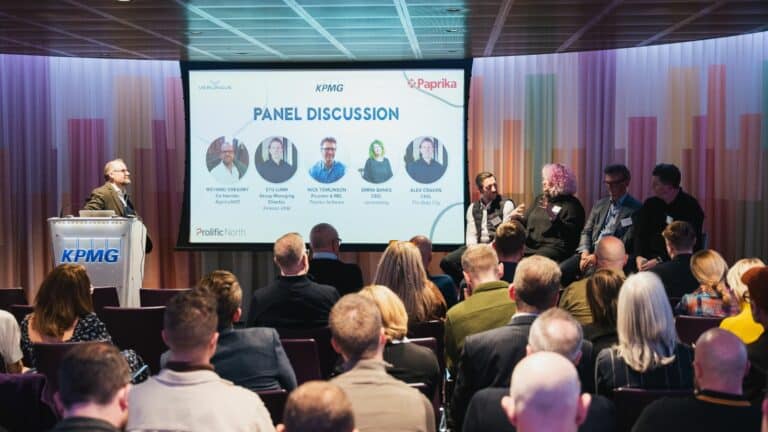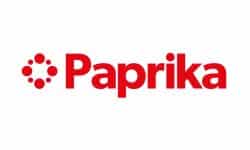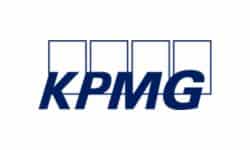Agency leaders from ambitious digital and tech companies united for a special Prolific North event hosted in Leeds yesterday, filled with insights on scaling, talent, acquisitions and investments from a stellar line-up of agency experts.
Hosted at headline partner KPMG‘s office on 13 November, the afternoon conference kicked off with a welcome from Prolific North’s editor, David Prior, and Richard Gregory, co-founder of AgencyNXD, with a thank you to event partners KPMG, Verlingue and Paprika Software.
Nenad Simonovic, UK head of digital media at KPMG, and then Nick Tomlinson, founder and MD of Paprika Software took to the stage, setting the scene of the existing agency landscape in the midst of market upheaval. Private equity is on the rise, said Simonovic, with “lots of activity” on the M&A side, while Tomlinson added there is a big opportunity when markets emerge from a slowdown.
Next, Mark Mallinder, CEO at Ride Shotgun, shared his insights on challenging, appraising and reinventing your current business model. With the rising impact of AI, he said the need for focus has “never been more important” and it’s easy for agency leaders to “get distracted by noise”. Any agency is capable of scaling for growth but it just needs right focus, discipline and leadership.
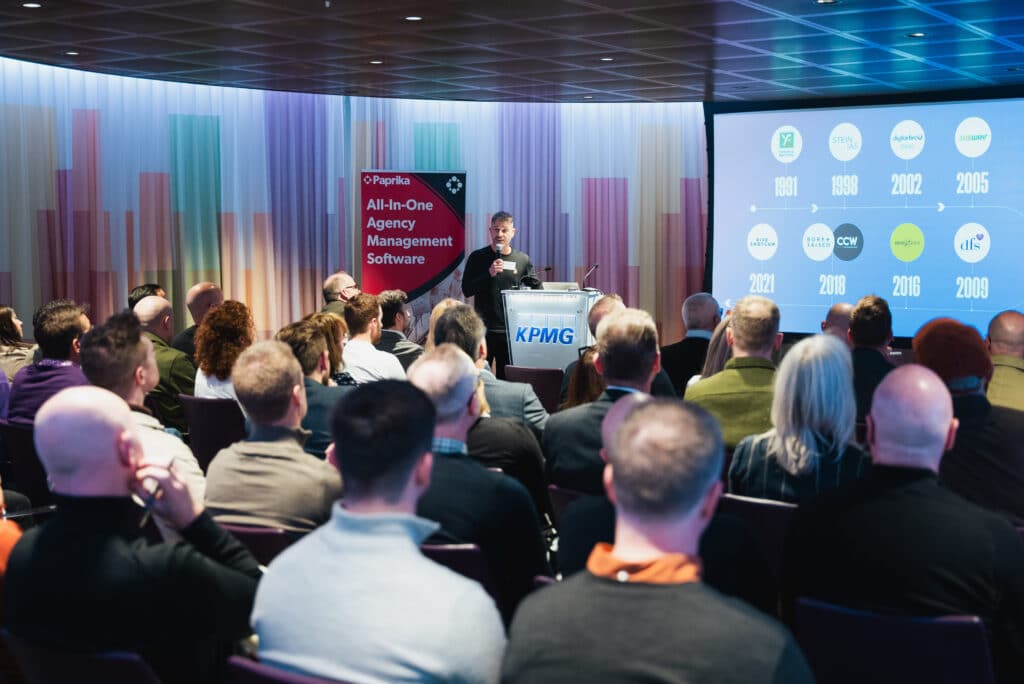
With over 30 years’ experience working client-side, at agencies and as a business owner, Mallinder shared his career journey up until Ride Shotgun, which has since become one of the fastest-growing independent agencies in the UK.
With almost 200 staff spread across nine offices, Ride Shotgun has “big ambitions” on the horizon. On success, he explained how leaders should work on the business – not in it. The team should be focusing on the day-to-day, while the business owner should always be thinking about where the agency is heading next. He shared his top tips and the key things agency leaders should do to successfully scale:
- Learn to delegate effectively, many agencies get stuck around £1.2m mark.
- Alignment. Have a single objective all the team can buy into.
- Prioritise. Keep things simple. With a talented and enthusiastic team, you can have plenty of ideas but you should remain disciplined.
- Build a great team. He said this is absolutely critical, and leaders should ensure they have high quality people, open and transparent communication, and a culture built on power and trust.
- Challenge and adapt – this could be embracing the power of new tools or AI.
Attracting and retaining staff
Next, Richard Gregory from AgencyNXD was joined on stage by Ben Turner, people director at IDHL and Martin Corcoran, CEO at Summit Group, to delve into how to incentivise your key employees and the practical ways to attract and retain your key staff.
Ben Turner, IDHL’s first people director, has helped spearhead the company’s growth from 260 to over 400 employees, navigating acquisitions and rebranding along the way. He shared invaluable insights from his 20 years of HR experience, revealing how having career and pay development and progression in place is key to attracting and retaining staff.
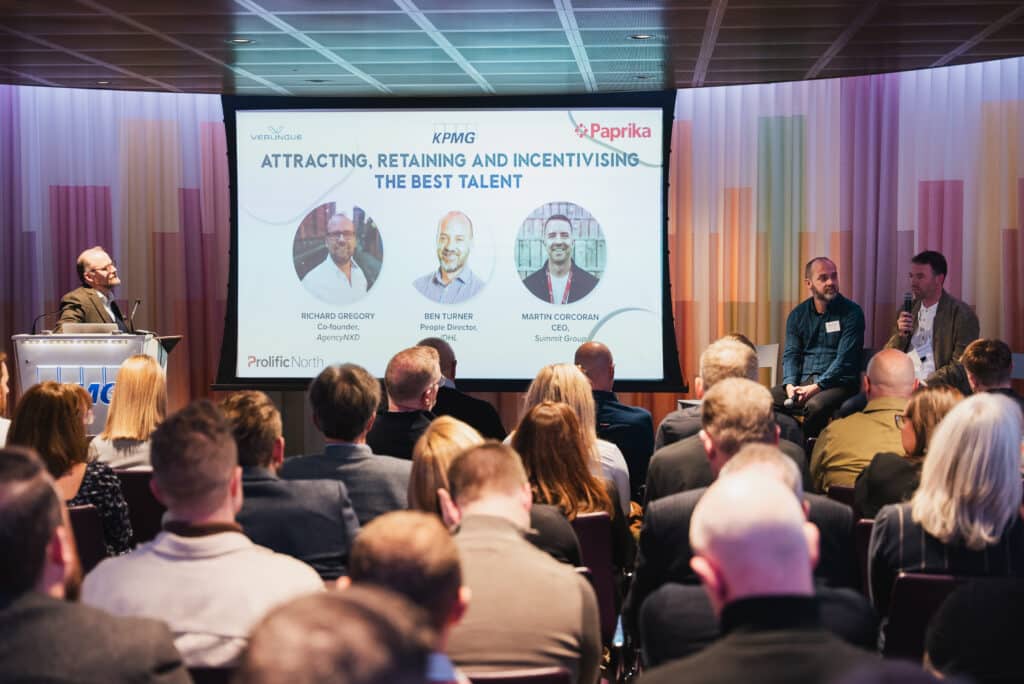
Martin Corcoran, CEO of Summit Media and Productcaster, brought his entrepreneurial perspective to the table. Having worked with giants like Tesco and Aldi, he explained the power of a motivated team and said he spends 25 to 50% of his time thinking about people.
Quizzed on why potential employees want to join their companies, Turner said joining a bigger team with more experience is often very attractive to those working at smaller agencies as they can learn more, have better pay progression and career development.
For Corcoran, geography is a “big selling point” with Summit Media and Productcaster being the largest agency in Hull with “great relationships” with local education providers, with some of the best staff starting out as apprentices. Culture is “very important” and as an indie agency with around 90 staff and high retention, progression is vital. Benefits such as unlimited holidays are boll*cks though, he said, with the team at Summit Media receiving around 50 days off per year with compressed working which has been a hit.
Turner agreed on the importance of flexible working. When it comes to learning and development, leaders need to make sure the management capability is right. On retention, he said at IDHL voluntary attrition is around 15-20% which is the “right spot”. The number is around 20-30% for Corcoran, which he said is good to welcome in fresh ideas and attitudes.
Someone will “always pay more for your talent,” warned Turner, so salaries must be competitive. Corcoran agreed, adding that staff bonuses and rewards to make the team feel more included should be looked at as key retention drivers.
M&A market overview with KPMG
KPMG’s Northern head of digital media, Ben Taylor, followed next to delve into the M&A market. With an overview of what’s currently happening, he said inflation is starting to ease and now that the US and UK elections have wrapped up, it will alleviate some political uncertainty.
In the last quarter or two, marketing budgets reached their “highest peak” in specific areas – data-driven strategies, investment in AI-powered marketing technologies, plus social media centric marketing solutions.
On M&A, volumes were up by 4% from this time last year. The value of spend decreased by nearly 20%, and he added there is now a more targeted approach from acquisitive businesses which are now looking for more specialist agencies to bolster capabilities, rather than generalists. 46% of deal volume is made up of private equity, a trend he expects will continue into 2025.
Mergers, acquisitions and investment
Next, we delved into the world of mergers, acquisitions and investment with Fergus Baillie, CEO at The Baillie Group, and Dean Lovett, CEO at McCann Central and chairman at McCann Manchester.
Chairing the discussion, Ben Taylor from KPMG asked the duo about their careers before uncovering valuable tips into what buyers and investors are looking for right now.
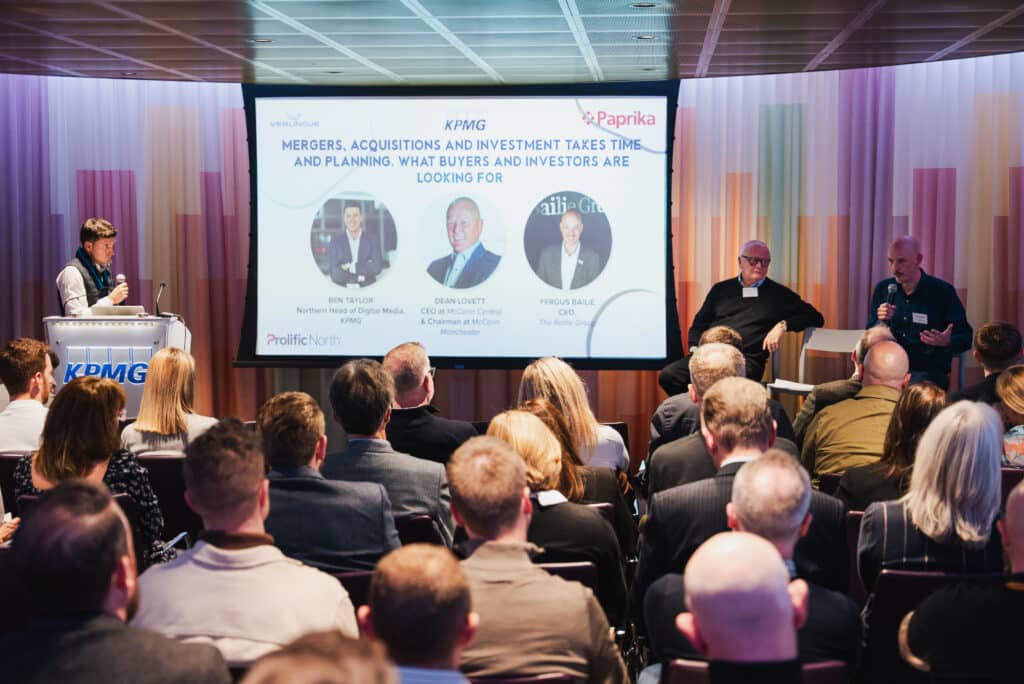
Reflecting on when he set up his first advertising agency which grew to around 150 people, Dean Lovett explained how at the time it was “just a laugh” as he was young at the time but “had enough of the business” just before it was acquired by McCann.
Joining McCann “made the biggest difference” as the opportunity helped him to “enjoy the experience” and feel more challenged than when he owned his own agency. Now as CEO at McCann Central, the agency has had “phenomenal growth” from global clients to offices, now with around 530 staff.
With an overview of The Baillie Group’s story, Fergus Baillie explained how it is a second generation business set up by his father. Now with around 450 staff, the agency has grown through acquisitions initially with printing companies in the 90’s but with the advent of tech, pivoted to acquire professional services businesses with M&A used to change the direction of the business.
On challenges and advice, Lovett said in the early days of building his agency, the pace of growth was “great” but the big concern was always over cashflow and ensuring salaries were paid at the end of the month. Joining McCann, he said he “learnt a lot”, especially that there is a ratio for everything and the importance of “good discipline”.
Often with agency growth, businesses need to “restructure and change”, explained Baillie, with a focus on likeminded people to the right team. He warned leaders not to underestimate how long a sales process can take.
On what makes a business attractive to acquisitive companies like McCann, Lovett said you have to sell a team and business as the agency looks at whether it will be strategic and if the business is margin accretive. He advised people leave really quickly when made to feel they are just employees – businesses need to take people with them when selling.
It might be “easy” to do an acquisition but it needs to make sense.
Planning ahead, managing risk and realising opportunity
Following a networking break, attendees returned to find out more about planning ahead, managing risk and realising opportunity during a panel session with Richard Gregory, co-founder at AgencyNXD; Carrie Rose, CEO at Rise at Seven; and Maia Olesen, client director at Verlingue.
Carrie Rose gave a background to her career pre Rise at Seven and how previously working at Branded3 set her up for success. After applying for The Apprentice, she declined an offer from Lord Sugar and it paved the way for the idea behind Rise at Seven, which she co-founded with Stephen Kenwright who “took a risk” with her.
Over the past five years, the agency has “strategically expanded” to become “famous at digital PR”. The business recently went through an MBO and in year four, Rose admitted she is “knackered” from the long journey in taking the business over, and expanding even further with social as a service and launching in the US.
Recently pulling out her old business plan from The Apprentice, she noticed how her vision has remained the same. Profit, impact and joy are the three key quarterly targets she focuses on and said 50% of clients always need more than two services that Rise at Seven offers.
There have been plenty of changes along Rise at Seven’s journey, from three senior staffers leaving to set up their own agency, a pandemic and an MBO but she “always pulls it back to the original vision”.
As a risk taker, she explained how Kenwright once said she “jumps off a diving board and invents water on the way down”. One lasting piece of advice that has stuck with her is to focus on sales as it brings everything from tools to staff. Recognising that the early days of the agency was “chaos” early on, the past two years have been focused on growth and “sorting the house out”.
On risk, Maia Olesen said insurance is a “necessity” especially with big growth and big ticket brands flooding in and there needs to be someone in place to read those contracts and offer guidance to leaders.
As a rule, Rose said she is strict that no client is more than 10% of revenue. In 2022/23, the agency lost 35% of clients but has been “good at managing risk” by ensuring Rise at Seven sticks to that 10% rule. She explained how she stress tested the business after spending four months in Texas to see what would happen, and has since learnt how to delegate to the team and is proud of how they have become their own “mini entrepreneurs”, overseeing their own departments.
With rapid growth over the past four years, she explained how a lot of it was “not sustainable at times”, particularly during the pandemic. Her vision is for 20% growth year-on-year, and hit 18% this year. The ultimate goal is to sell, teasing that it would be to someone that can help her hit that impact goal of becoming the first search agency to win a Canne Lions, although she’s not sure quite yet what she would do after she leaves the business.
The final session of the day wrapped up with insights from Stu Lunn, group MD at Kinesso UK&I; Nick Tomlinson, founder and MD at Paprika Software; Emma Banks, CEO at ramarketing; and Alex Craven, CEO at The Data City, kicking off with their takes on the market.
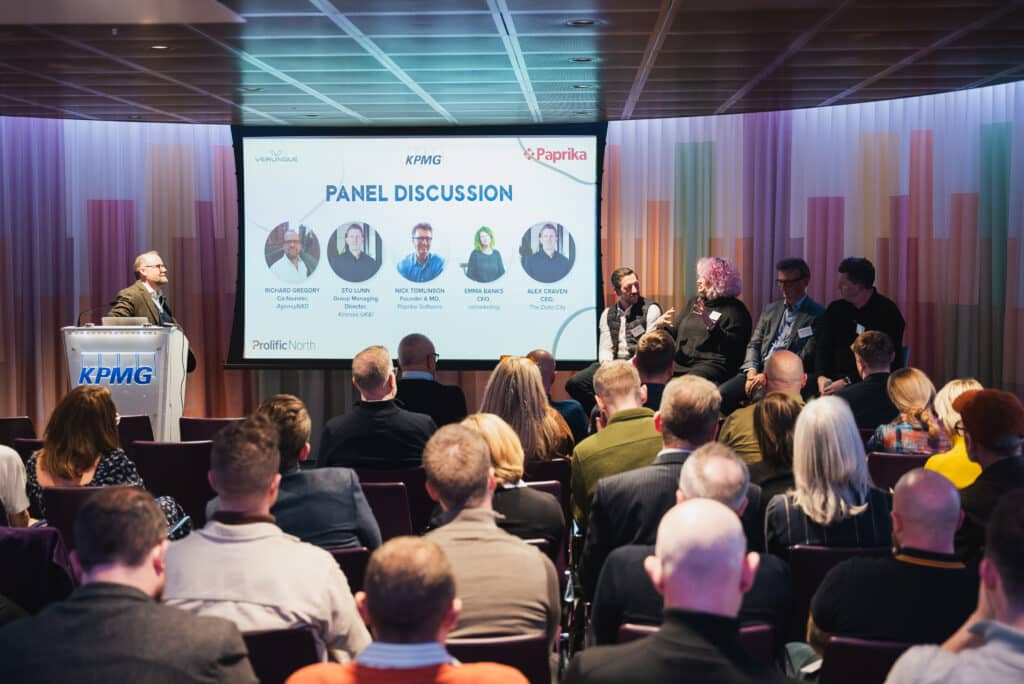
Emma Banks explained how marketing budgets are typically the “first to go” especially in the pharma sector. Ramarketing is PE-backed, which can have a “level of pressure” when it comes to growth. For Nick Tomlinson, he likened the market to a starling murmuration, with people listening and following others.
With more competition for eyeballs, the market has “never been more volatile”, explained Stu Lunn, but there are plenty of opportunities. With the growing success of the indie agency sector, those agencies are “more trusted” by clients to push boundaries. Around six out of 10 enterprise clients say they will in-house more services in future, he added, which will become a challenge.
On failures, setbacks, learnings and successes, Lunn said he previously successfully turned around a BBC account which was “great to keep in the region” and Kinesso is the “only” network that seeks out relationships with indies and even intros them to clients if they may be a better fit.
Banks said she is proud of her successes while her learnings were all about hiring and creativity. “Over engineering” things can prevent people from thinking creatively, staff need space and should “not be afraid to fail”.
Alex Craven said a big achievement is when someone wants to buy your business, while a setback can often be the “actual acquisition process”. He warned leaders to be careful of who they sell to and “weary” of earnouts, as it can leave you isolated from your team with selfish motivations.
The panel also shared their thoughts on AI, plenty of opportunities around automation, explained Craven. But the panel agreed there are plenty of challenges too, particularly with copyright issues using tools such as Midjourney.
While Stu Lunn said Kinesso embraces AI “in the right way”, Tomlinson said AI is “overhyped” and doesn’t think it will ever be as original or creative as a human can be.
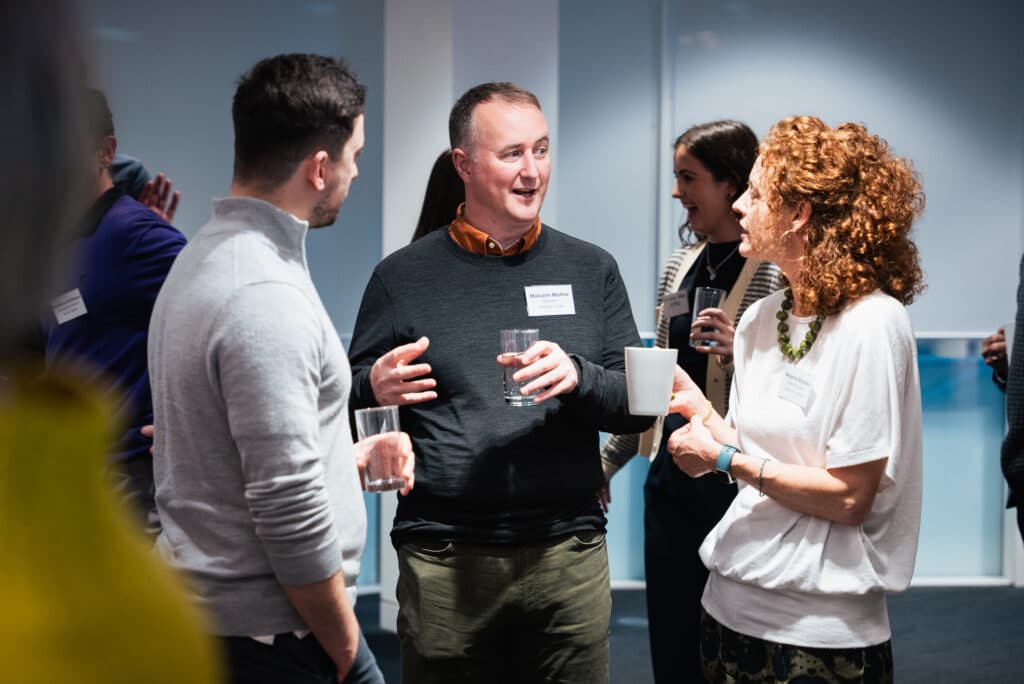
Thanks to everyone that attended and to our event sponsors:
Headline partners
Session sponsor




